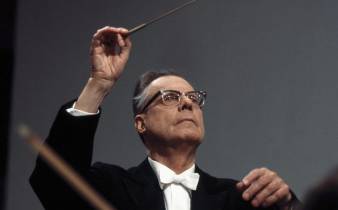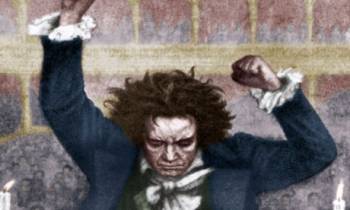
Karl August Leopold Böhm (August 28, 1894 in Graz – August 14, 1981 in Salzburg) The Austrian conductor, Karl Böhm, the son of a lawyer, studied law before he entered the Graz Conservatory and then the Vienna Conservatory, where he studied under Eusebius Mandyczewski, the friend of Johannes Brahms. In 1917 Karl Böhm became a rehearsal assistant in his home town, in 1919 the assistant director of music and in 1920 the senior director of music. In 1921, Bruno Walter called him to Munich. In 1927 he was appointed as chief musical director in Darmstadt. From 1931 to 1934 he fulfilled the same function at the Hamburg Opera and was appointed professor. In 1933, he conducted in Vienna for the first time in Tristan and Isolde by Wagner. He succeeded Fritz Busch, who had gone into exile, as the head of the Dresden Opera from 1934 to 1942. This was an important period for him in which he conducted first performances of works by Richard Strauss Die schweigsame Frau (1938), and Daphne (1938), which is dedicated to him. He also conducted the first performances of Romeo and Juliet (1940) and Die Zauberinsel (1942) by Sutermeister, and the Concert No. 2 for cornet (1943) by R. Strauss. In 1938 he took part in the Salzburg Festival for the first time, conducting Don Giovanni by Mozart, and thereafter he became a permanent guest. From 1943 to 1944 he directed the Vienna Opera. On the occasion of the 80th birthday of Richard Strauss, he conducted the festival performance of Ariadne on Naxos. In 1948 he conducted Don Giovanni at the Scala, in 1949 he gave a guest performance in Paris with the Vienna Opera. From 1950 to 1953, Böhm directed the German season at the Teatro Colón in Buenos Aires, and conducted the first Spanish performance of the opera Wozzeck by Alban Berg, which had been translated into Spanish for this occasion. In 1953 he was responsible for the first performance of Gottfried von Einem's work Der Prozess. From 1954 to 1956 he directed the reconstructed Vienna Opera. In 1957 he conducted Don Giovanni at the Met. In 1962, he gave his debut in Bayreuth with Richard Wagner's opera Tristan and Isolde, which he conducted until 1970. 1964: The Mastersingers of Nüremberg by Wagner in Bayreuth; 1965 Fidelio by L.v. Beethoven in Tokyo; 1965-1967: Der Ring des Nibelungen by Wagner in Bayreuth - the last production by Wieland Wagner; 1971: visit to Moscow and The Flying Dutchman by Wagner in Bayreuth. Karl Böhm's unyielding harshness and youthful spirit, his sensitivity, authority and total commitment to the music characterised this conductor, who always receded behind the works he conducted. He owed his world-wide success to his diligent life style. He appreciated Richard Strauss, L.v. Beethoven, Richard Wagner, Anton Bruckner and Alban Berg, but his special devotion was reserved for Wolfgang Amadeus Mozart, whose symphonies he recorded in 1974. He received numerous many honors, among which 1964 first Austrian ‘Generalmusikdirektor. ***************************** 
Ludwig van Beethoven Symphony No. 9 in D minor, Op. 125 Gundula Janowitz, soprano Grace Bumbry, mezzo Jess Thomas, tenor George London, baritone Chor und Orchester der Bayereuther Festspiele 23.07.1963 (live) Elisabeth Grummer, soprano Christa Ludwig, mezzo James King, tenor Walter Berry, baritone Chor und Orchester der Deutschen Oper Berlin 7.11.1963 (live) Karl Böhm
*****************************
Записи из личной коллекции | 
